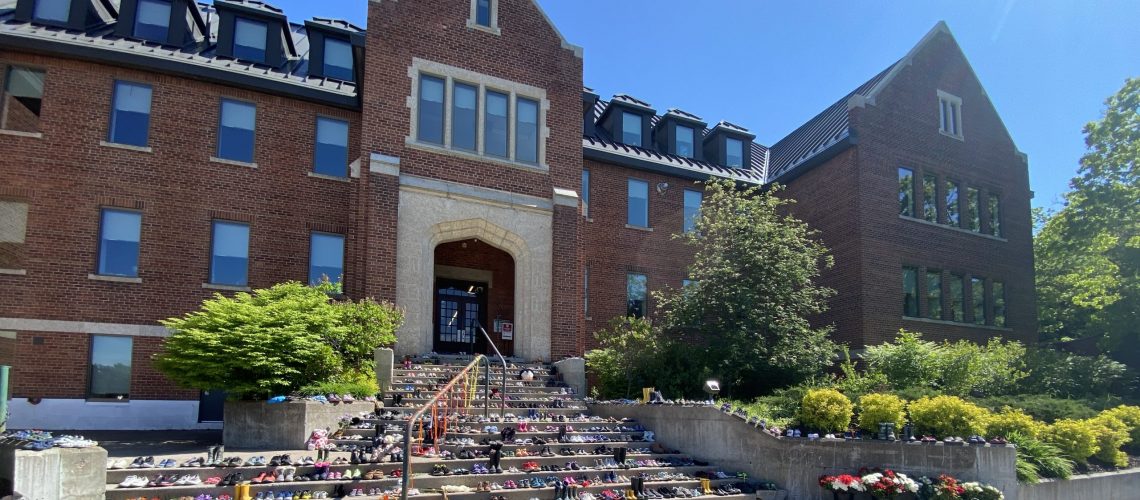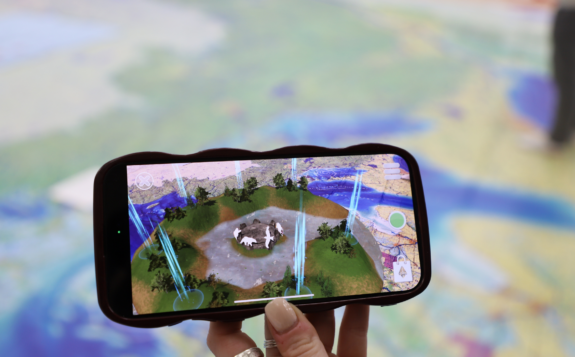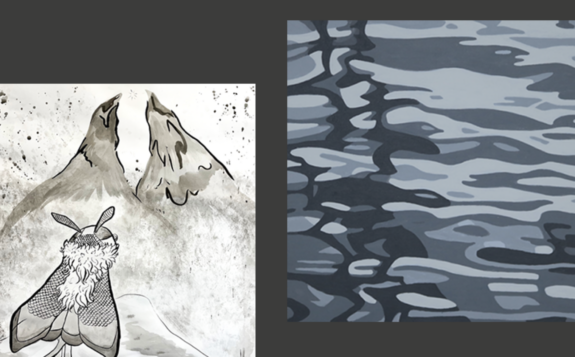Commitment to Action following Kamloops Residential School Findings
June 1st, 2021
On Sunday, May 30th, Algoma University (AU) along with a number of our partners, including the Children of Shingwauk Alumni Association, Shingwauk Anishinaabe Students’ Association, Algoma University Students’ Union, Shingwauk Kinoomaage Gamig (SKG), Shingwauk Education Trust (SET), and the Anishinaabe Peoples Council released a shared statement acknowledging the recent news of a mass burial site containing the remains of 215 Indigenous children was revealed at the Kamloops Residential School site in Tk’emlúps te Secwépemc.
In light of what we have learned through the Tk’emlúps te Secwépemc announcement at the Kamloops Residential School, we are taking every measure, including the use of technology available to us today, to address the potential that there may be burial sites outside the marked gravesites in the Shingwauk Cemetery. It is incumbent upon us to do this work, alongside others who oversee portions of the Shingwauk site, and we will continue to move forward in a culturally respectful and responsible way.
Algoma University, along with our partners, are committed to addressing specific Calls to Action as laid out by the Truth and Reconciliation Commission. An update on Algoma University’s commitments to the Calls to Action will be released following the June 24th meeting of the Algoma University Board of Governors.
We are conscious of the shared history between our site and that of other residential school sites across our nation. The work on the Shingwauk site has been ongoing and through this work we have identified that one hundred and nine people are known to be buried in the Shingwauk Cemetery, with seventy two of those being students from the Shingwauk Residential School. The others are staff and people associated with the Anglican Church. We recently worked with the Children of Shingwauk Alumni Association to create an updated burial register which lists the names of each person buried within the cemetery. The University, and its partners, are committed to ensuring the ongoing care of the Shingwauk Cemetery, including the support of spiritual work led by Anishinaabe people at SKG and AU.
In 1971, the former Shingwauk Residential School became home to the then Algoma College/University. Over the years and more recently, Algoma has committed itself to improving relationships with Anishinaabe people. Given our current home and its history, Algoma University takes its responsibility to former students of both the Shingwauk and Wawanosh Residential Schools and their families very seriously. We continue to be guided in our work by our partners and our spiritual advisor to ensure that our work is done in a good way, building upon the tremendous work of the Children of Shingwauk Alumni Association and the Shingwauk Residential Schools Centre staff.
Additional Shingwauk Site Partner Quotes:
“As a community, we acknowledge the impact this news has on both Anishinaabe and non-Anishinaabe people. We will continue to address the intergenerational trauma brought upon by the residential school era and its ongoing impacts to survivors and their successive generations. We have been, and will continue to be, committed to receiving guidance from the Children of Shingwauk and our Indigenous partners. We continue to be guided through ceremony while utilizing the teachings and cultural protocols provided by our spiritual advisor to support our efforts.”
Asima Vezina, President and Vice-Chancellor of Algoma University
Mary Wabano-McKay, Vice-President, Nyaagaaniid – Anishinaabe Initiatives, Equity & Student Success
“We grieve with the local IRS survivors and support the efforts of our communities coming together to support all those affected. We wish to extend our deepest condolences and prayers to the families and survivors of the Kamloops Residential School in Tk’emlúps te Secwépemc. Recognizing that many people are triggered by the news, we also want to encourage our community members who require support to access services available through our health and wellness programs in Batchewana First Nation and Garden River First Nation.”
Chief Dean Sayers, Batchewana First Nation
Chief Andy Rickard, Garden River First Nation
“The Shingwauk Anishinaabe Students’ Association and the Algoma University Students’ Union understand the impacts of the recent discovery of a mass burial site of 215 children at the Kamloops residential school. Our hearts go out to the families and communities as they grieve this loss of the children who never came home, and whose absence will forever have an impact on the community. This discovery, as heartbreaking as it is, should lead to further investigations of possible burial sites on residential school properties across Canada. Our people have shared stories through the TRC about what they had seen and heard about what happened to some of those children. Algoma University has committed to a trust relationship with local Indigenous communities since its early years as a college to its current status as an independent university. In the spirit of that trust and commitment to reconciliation, Algoma University indicated its support for the residential school survivors and the trauma that continues to reverberate across communities and across the country. SASA and AUSU call for a concerted effort by Algoma University to ensure that the property be fully examined under the direction of the Anishinaabe partners to find all burial sites located on the property.”
Angela Trudeau Day, SASA President
Rebekah Gwynn, AUSU President
“The Algoma University Board of Governors are heartbroken with the recent findings of a mass burial site containing the remains of 215 Indigenous children in Kamloops. We collectively are reflecting on the impacts to our communities, including the survivors of the Shingwauk and Wawanosh Indian Residential Schools. We are committed to listening and supporting our communities through sharing, healing and learning.”
Shelley Schell, Chair of the Board of Governors
“The tragic news of the discovery of additional lost lives at the former Kamloops Residential School once again brings to the forefront of everyone’s mind the indignities that Indigenous communities suffered in the past and continue to struggle with. We recognize that the anguish of our Indigenous friends, colleagues, and neighbours is multi-generational, and we will continue to walk beside them on their path to healing, and will attempt to be leaders in reconciliation.”
Dr. Laurie Bloomfield, Speaker of Senate
“We, the full-time and part-time faculty members of the Algoma University Faculty Union – OPSEU Local 685, acknowledge and stand with the survivors of the residential school system; we grieve the loss of lives done in the name of genocide. We commit ourselves to the work on educating and facilitating the knowledge about residential schools to our students and our communities. We call on the governments to support the survivors and their communities with the necessary resources to make sure that all the children are found.”
Dr. Myles Fredirick McLellan, President
Dr. Deborah Woodman, Vice-President, Full-time unit
Professor Tony Fabiano, Vice-President, Part-time unit
“As members of the OSSTF District 35 Algoma University Support Staff, we are deeply saddened by the news of the tragic loss of 215 Indigenous children recently discovered at the Kamloops Residential School site in Tk’emlúps te Secwépemc. We grieve the loss suffered through the residential school system, and we are committed to joining other partners on the Shingwauk site as part of our ongoing efforts to address the impact of the residential school system in our community and beyond.”
Bev Teller, President
Michelle Dayboll, Vice-President
Bizindan, Nanagetengdimowin zhigo dotan! (Listen, think and do!) “The School of Social Work is deeply saddened by the recent discovery of the burial remains of 215 children at the former site of Kamloops Indian Residential School located on Tk’emlúps te Secwépemc First Nation in British Columbia. The discovery has once again magnified the atrocities that many vulnerable and innocent children were forced to endure while attending Residential School Institutions across Canada, and globally. We’d like to acknowledge all of the innocent children who also attended the Residential School Institutions in the Kenora District. This revelation forces many Residential School survivors to lament, to re-visit, and to re-examine their own childhood experiences, and to acknowledge how precarious it really was for them to attend these institutions. A new image of innocent children having to run the Residential School gauntlet in order to survive has been envisioned by Dr. Rose Cameron, an Anishinaabekwe, who is a survivor of the Cecilia Jeffrey Indian Residential School. We all must understand the dire consequences of the Residential School experiences for many survivors and their families. Inheriting such an experience will require more understanding from everyone as survivors continue in their healing journeys.
We offer our hearts and prayers to these children in spirit, survivors of the Residential School Institutions, their families, their communities, and all those who are impacted by this forced upon cultural genocide. We wholeheartedly recognize all Indigenous students, staff, and faculty, our partners and communities, and we mourn with you.
We acknowledge that the uncovering of the remains at the Kamloops Residential School uncovers pain and grief for many of us. We acknowledge that Indigenous Elders know that it will take seven generations to heal from the residential school legacy and its effects. We encourage our Indigenous faculty and students to be gentle with ourselves and to reach out to supports that have been made available. We encourage our non-Indigenous allies, faculty, staff and students to make use of this recent uncovering to become more fully informed of colonialism’s impacts, including neocolonial dynamics, policies and practices. We also encourage all non-Indigenous allies to reach out to the Indigenous people in our lives to offer a listening ear, compassionate understanding and support. This is an opportunity to build greater ties that bind. This is a time for non-Indigenous peoples to acknowledge grief from the forces of ignorance and evil which perpetuate crimes against humanity. It is time to bear witness and pick up responsibilities.
We acknowledge those who had/have Indigenous relatives who attended various Residential Schools, and intergenerational survivors across the country. The list of Residential Schools in Canada can be witnessed here http://www.trc.ca/about-us/residential-school.html.
We, in the School of Social Work acknowledge and fully support the TRC as a living document which identifies 94 Calls to Action for all Canadians to continue working on reconciliatory action. See http://trc.ca/assets/pdf/Calls_to_Action_English2.pdf. We acknowledge Algoma University’s commitment to address any potential burial sites that may exist outside the marked gravesites in the Shingwauk Cemetery. We challenge the Federal Government, and Churches to support survivors and their families to examine the grounds for any potential burial sites at the Cecilia Jeffrey Indian Residential School, and the St. Mary’s Residential School properties.
If you are in need of support, you can contact:
- The National Indian Residential School Crisis Line 24-hours a day at 1-866-925-4419
- The Hope for Wellness Help Line 1-855-242-3310.
- Talk4Healing 1-855-544-HEAL
Article for you to read:
https://kenoraonline.com/articles/photos-a-history-of-residential-schools-in-kenora“
Algoma University School of Social Work
Due to the severity and nature of this situation, we ask that this be printed in its entirety.
Share Article



